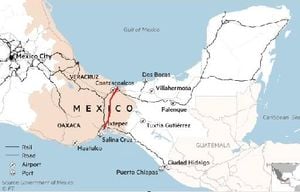Apple recently faced backlash after removing numerous virtual private network (VPN) applications from its App Store at the behest of Russian authorities. This move has raised alarms concerning censorship and corporate ethics, particularly as it relates to internet access and freedom of expression.
On July 4, 2024, it was reported by several sources, including Moscow Times and TechCrunch, 25 VPN apps were taken off the platform due to demands from Roskomnadzor, which is the regulatory body overseeing communications and internet services within Russia. Some notable names from the removed apps include well-known players like Le VPN, Red Shield VPN, NordVPN, and Proton VPN.
According to the information disclosed, the removals appear to stem from the apps violating local laws by hosting content deemed illegal by the Russian government. Roskomnadzor's letter to app developers indicated this decision was part of broader efforts to control and censor online access within the country.
The crackdown on VPN services is significant because these tools have become increasingly popular among Russian citizens, especially following the beginning of the war with Ukraine. VPNs allow users to mask their locations and gain access to content unavailable within Russia due to heavy government censorship, which has blocked numerous Western websites and social media platforms.
Developers of the affected VPN services received notifications from Apple explaining their violations of local laws and the impossibility of remaining on the App Store as long as they were not compliant. The drastic action came after Roskomnadzor had already initiated multiple waves of restrictions on VPN usage over the past year, making accessing global content more challenging for the Russian populace.
One developer, Vladislav Zdolnikov, CEO and founder of Red Shield VPN, voiced strong disapproval of Apple’s actions. He stated, “Apple’s actions are not just reckless but a crime against civil society.” He argued the company has relinquished its responsibility to safeguard user privacy and enable freedom of information.
An unsettling reality looms for both consumers and developers, as these VPN services have been critical for many Russians attempting to evade the strict controls imposed by the government. Without these applications, users are left with limited options, facing stricter limitations on their online activities.
The kerfuffle adds another layer of complexity to Apple’s relationship with Russia and the challenges faced by foreign businesses operating there. Previously, Apple had halted hardware exports to Russia and made various moves to protest the invasion of Ukraine, but had maintained access to its App Store.
This specific situation serves as a reminder of the fine line tech companies must walk between compliance with local laws and upholding principles concerning user privacy and freedom. The narrative of corporate responsibility and ethics takes center stage as the political climate evolves rapidly.
Security experts warn about the potential consequences of these actions. Analysts suggest as more VPNs are removed, users’ data may be increasingly vulnerable. Users may turn to lesser-known VPNs, which could potentially compromise their data security by not adhering to strict data protection practices.
Legal repercussions are another concern for both developers and users. Accessing prohibited content carries risks, including fines or even imprisonment for users within Russia. With this crackdown, VPN developers also face potential legal ramifications for operating apps considered illegal by the state.
Some VPN providers are attempting to adapt to the evolving situation. For example, Le VPN announced the launch of “Le VPN Give,” enabling users to connect via alternative means, attempting to facilitate access to its services with obfuscated VPN connections to counter censorship efforts.
The effectiveness of such strategies remains to be seen, but they reflect the determination of some developers to navigate the treacherous waters of censorship under Russian authorities. They continue advocating for freedom of information amid challenges posed by increasing government control.
This entire episode positions Apple alongside other companies facing similar challenges—culled between satisfying local government demands and remaining faithful to global standards of privacy and freedom. It encapsulates the core conflict many global companies encounter when operating within restrictive environments.
This scenario begs the question: should companies prioritize compliance with local laws when those laws infringe upon human rights and freedoms? This is not just about business operations; it raises critical ethical inquiries about corporate responsibility toward civil liberties.
While Apple may be focused on maintaining its business interests within the Russian market, the ramifications of such actions can extend beyond revenues. The perception of its corporate values and commitment to user privacy hangs tenuously, showcasing the delicate balance technology giants must maintain.
Onlookers and rights activists have raised warnings on how this might set precedent for other companies, sending ripples across the tech industry globally. Advocacy groups continue to encourage users to demand changes from Apple and other tech firms to uphold their commitments to user rights.
By all indications, this story is far from over, and developments will likely spur debates on regulatory compliance versus ethical responsibility. The intersection of tech, politics, and human rights remains fraught with complexity—showing no signs of simplicity as companies navigate future legal landscapes.
Ultimately, the fight for internet freedom continues, and the response to these actions from both the tech community and the users will be critical as they shape the evolving narrative.



